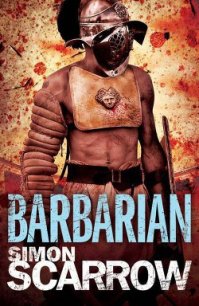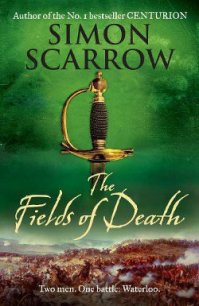Young bloods - Scarrow Simon (библиотека электронных книг txt) 📗
Napoleon hid his anger. Despite his avowed support for Corsican independence, he was proud of his uniform. Now more than ever he was convinced that he had been born to be a soldier and he wore the dark blue coat with red trimming as if it was a second skin.Yet he could see that his mother was concerned and he needed to put her mind at ease.
'I have some spare clothes in my valise. I'll wear those.'
Letizia relaxed a little and some of the strain left her face. 'Thank you. I know it means a lot to you, but there's your safety to consider, and ours. Please stay out of trouble.'
Napoleon nodded. The island's tradition of vendetta meant that the dishonour of the individual extended to the entire family. The irony was that Napoleon felt a burning desire in his heart for Corsican independence. But any rebel hiding in view of a mountain road to ambush one of the occupiers would certainly shoot him long before Napoleon had a chance to explain himself.
'Don't worry, Mother. I'll keep to myself. Besides, I have in mind a few tasks that I must begin. I want to write a history of Corsica. That should keep me busy.'
'A history?' Letizia arched her eyebrows and muttered, 'What is the point of that?'
Joseph stared at his younger brother for a moment and then laughed.
'What?' Napoleon frowned. 'What is it?'
'Nothing really. It's just that I haven't seen you for so long, not since you were an ill-tempered little brat. Now you are, as you say, a man. And a serious-minded and driven one at that. It's just taking me a little time to adjust to the changes in you.'
'Joseph's right,' Letizia nodded. 'You have changed. It seems I've lost my little boy for ever.'
She stood up suddenly and walked hurriedly towards the door. Only when she was outside the room did she begin to cry.
The next day, after the children had been sent to school, Joseph helped his brother to unpack the luggage. When the lid of the chest was lifted he gasped in surprise to see that it contained little else but books and a small writing set. As the books were taken out and found a home in an old crockery cupboard, Joseph marvelled at the range of his brother's reading.
'You can't have read all of these, surely?'
'All of them. I've only kept the books that interested me.That's one of the advantages of living in France,' Napoleon smiled. 'You have the chance to read all that there is to read, and sort out what knowledge is worth retaining and what isn't. This,' he patted the chest, 'this is the good stuff.'
'One day, your history of Corisca will be in a chest just like this.'
Napoleon laughed. 'I hope so. It would be nice to leave some kind of a mark on the world. How about you, Joseph? What is your ambition?'
'Me? I haven't really thought about it. At the moment I'm studying to become a lawyer, but what do I want to do?' He thought for a moment. 'I suppose my ambition is to have a wife, children and a comfortable home.'
'That's it?'
'Yes.'
Napoleon shook his head, partly in disbelief and partly in pity. Not that he would have said so to his brother. Joseph might not have much drive to achieve things, but beneath it all he was an innately good man; a quality that Napoleon recognised and valued.
He selected a few books and placed them into a large knapsack, along with a change of clothes.Then he looked up at Joseph, who was still unpacking the books.
'Well, if your ambition is to be realised, we have to pay off Father's debts. Once I've settled in I'm going to Mellili for a few days, to see what needs to be done to restore the place. I don't like having to leave home so soon, but we need some income. If we're in luck it might be possible to rent the farm out.While I'm there I'll have a look at the plantation.'
'I'd come with you, but I have to study for an exam.' Joseph smiled at his brother. 'As soon as it's over, I'll join you.'
Chapter 40
The approach of autumn was immediately evident as Napoleon strode up the road that led out of Ajaccio and into the hills. The air was cooler and the leaves on the trees were starting to turn rusty brown and yellow. But for Napoleon, the experience of walking into the hills he had not seen since childhood filled him with a pure joy he had not felt for years, and every sense drank in the details of the landscape about him. When he came to a bend in the road round a steep hill he stopped, sat on a flat slab of rock and gazed back down the slope to Ajaccio and the sparkling blue sea beyond. After Paris the town of his birth seemed small and provincial.
For the first time he appreciated how his father must have felt. If he had allowed his boys to be educated in Ajaccio they would never have the chance to amount to much. Although the town was a nice quiet backwater in which to raise a family, it could become a trap if they were allowed to stay. But as he gazed down on the red-tiled roofs clustered around the harbour, in the shadow of the thick walls of the citadel, Napoleon could not help feeling that he belonged here, that his father had been wrong to send them away. Perhaps a quiet life of pastoral charm and beauty could be fulfilling enough.
He stood up and took a last look down at Ajaccio, and his gaze fixed on the citadel, where the Bourbon flag gleamed in the clear sunlight. Tiny figures in white uniforms patrolled the walls. Napoleon frowned as he noted the artillery pieces evenly dispersed around the inner wall.They should have been mounted on the outer bastions where they could enfilade any attackers. He stopped that line of thinking with an amused smile. He was on leave. Military matters need not concern him for many months to come. Let the garrison commander place his guns where he liked. For the moment the world was at peace and there were no attackers to beware of. And certainly, there were better things to occupy Napoleon's mind than textbook deployments of artillery pieces.
With Ajaccio lost from sight behind the mass of the hillside, Napoleon strolled happily past small farms and olive groves he remembered from childhood. He exchanged greetings with the few people he met along the road, but whereas the child Naboleone had been known to most of them, the thin young man with long dark hair and peculiarly attractive grey eyes was not, and they responded to his smiles with typical Corsican reserve.
It was just after noon before the road reached the junction with the track that led to the village of Alata. A short distance beyond stood the pillars at the entrance to the small estate that had been owned by his family for generations. Beyond the pillars the track leading up to the house was overgrown with weeds and grass, and was only defined by the line of poplars that grew alongside as the track wound up a hill of abandoned olive tree terraces. When he reached the top of the hill Napoleon could at last see the house, a low stone structure with outbuildings to one side.There was no sign of life as he approached and he noted the missing tiles on the roof, the cracks in the plaster on the walls and the faded and peeling paint on the window shutters. Clearly a great deal of work would be needed to make the place habitable enough for a tenant.
Climbing up the short flight of stairs to the front door, he lifted the latch and pushed the heavy door open. Inside smelled damp and earthy, and there was a faint rustling on the tiled floor as a large lizard scurried for cover. Napoleon set his haversack down on a table and explored the house, opening the shutters as he went from room to room. Tiles were missing above most rooms and rain had leaked in and stained the floor. In one bedroom, a section of the roof had collapsed and crushed the child's cot beneath. Ivy had grown across some of the windows and tough tendrils had even begun to force their way inside and spread along the walls.




